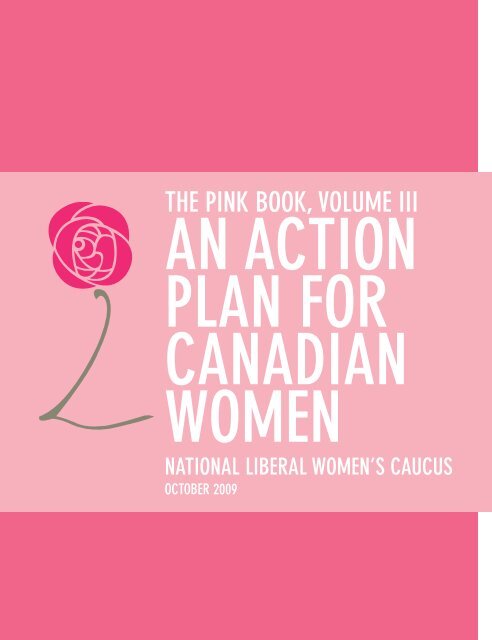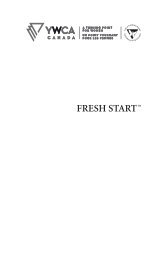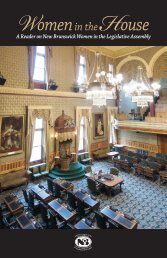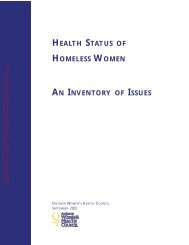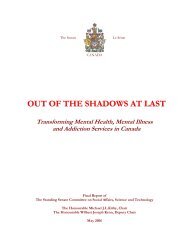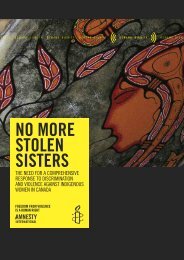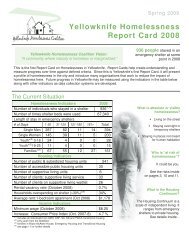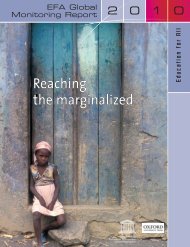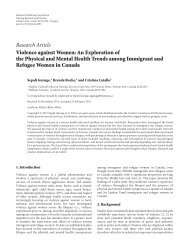THE PINK BOOK, VOLUME III - YWCA Canada
THE PINK BOOK, VOLUME III - YWCA Canada
THE PINK BOOK, VOLUME III - YWCA Canada
Create successful ePaper yourself
Turn your PDF publications into a flip-book with our unique Google optimized e-Paper software.
<strong>THE</strong> <strong>PINK</strong> <strong>BOOK</strong>, <strong>VOLUME</strong> <strong>III</strong><br />
AN ACTION<br />
PLAN FOR<br />
CANADIAN<br />
WOMEN<br />
NATIONAL LIBERAL WOMEN’S CAUCUS<br />
OCTOBER 2009
As the chair of the National Liberal Women’s Caucus, I am proud to have worked side<br />
by side with my caucus colleagues for the improvement of the lives of women in <strong>Canada</strong>.<br />
Our efforts have resulted in parental leave, care-giving leave, the National Child Benefit<br />
and other initiatives put in place by past Liberal governments to benefit women.<br />
Stephen Harper’s Conservative government is ignoring women in <strong>Canada</strong>. Women are<br />
facing ever-intensifying challenges in their daily lives, challenges which a global recession<br />
and the repressive and backward attitudes of the Conservative government have only<br />
exacerbated.<br />
Women in <strong>Canada</strong> deserve better, and so the National Liberal Women’s Caucus continues<br />
to fight for their needs in an increasingly-regressive political climate.<br />
The National Liberal Women’s Caucus is proud to present The Pink Book, Volume <strong>III</strong>.<br />
These policy goals continue the work of Volumes I and II in defending and voicing the<br />
concerns of those women in <strong>Canada</strong> who are often overlooked and ignored, especially<br />
by Stephen Harper’s Conservative government. Only by acknowledging these groups—<br />
and by fighting for their equality—can we eliminate the gender and economic disparity<br />
that plagues so many women in <strong>Canada</strong>. The recommendations of The Pink Book,<br />
Volume <strong>III</strong> strive to identify these problems and suggest solutions so that a new federal<br />
Liberal government can work toward improving the lives of Canadian women.<br />
Sincerely,<br />
Hon. Maria Minna, P.C., M.P. (Beaches-East York)<br />
Chair, National Liberal Women’s Caucus<br />
National Liberal Women’s Caucus, 2009, Volume <strong>III</strong><br />
1
In The Pink Book, Volume <strong>III</strong>, the National Liberal Women’s Caucus outlines key policy<br />
recommendations to a new federal Liberal government. These recommendations stem<br />
from our efforts in conjunction with women across <strong>Canada</strong> to identify—and work to<br />
resolve—the obstacles confronting many women on a daily basis. We continue to hear<br />
from women in our constituencies and in our day-to-day lives whose input we have<br />
sought to incorporate in our recommendations.<br />
The Pink Book, Volume <strong>III</strong> builds upon the extensive work carried out by all of us in<br />
the National Liberal Women’s Caucus in the creation of The Pink Book, Volume I and<br />
Volume II. By advocating that a new federal Liberal government adopt these policies, we<br />
seek to improve the lives of Canadians in a significant, real way. These recommendations<br />
cover a broad range of issues; and focus on some of <strong>Canada</strong>’s most overlooked groups,<br />
paying special attention to working women, Aboriginal women and women in vulnerable<br />
situations. These—and indeed all women—are whom the National Liberal Women’s<br />
Caucus represents.<br />
The National Liberal Women’s Caucus remains committed to working to eliminate poverty,<br />
violence against women, exploitation, and unfair economic practices.<br />
We are dedicated to one purpose: to work to assist women in <strong>Canada</strong> in achieving<br />
their goals.<br />
Sincerely,<br />
Hon. Anita Neville, P.C., M.P. (Winnipeg South Centre)<br />
Critic for the Status of Women<br />
2 <strong>THE</strong> <strong>PINK</strong> <strong>BOOK</strong>, An Action Plan for Canadian Women
<strong>THE</strong> <strong>PINK</strong> <strong>BOOK</strong>:<br />
Table of Contents<br />
Summary 5<br />
Women in the Economy . . . . . . . . . . . . . . . . . . . . . . 6<br />
Women’s Health and Safety . . . . . . . . . . . . . . . . . . . . 8<br />
Women’s Equality . . . . . . . . . . . . . . . . . . . . . . . . . 9<br />
Introduction 11<br />
Unequal Opportunities:<br />
Women in Stephen Harper’s <strong>Canada</strong> . . . . . . . . . . . . . . . 13<br />
Women in the Economy 15<br />
Reducing Women’s Economic Vulnerability . . . . . . . . . . . . . 16<br />
Providing Affordable Housing . . . . . . . . . . . . . . . . . . . . 18<br />
Promoting Women in Science, Engineering,<br />
Technology and the Trades . . . . . . . . . . . . . . . . . . . . 19<br />
Women’s Health and Safety 21<br />
Supporting Health for Women and Families . . . . . . . . . . . . 22<br />
Health Needs of Forces Families . . . . . . . . . . . . . . . . . . 22<br />
Women as Caregivers . . . . . . . . . . . . . . . . . . . . . . . 23<br />
Ensuring Food Safety and Security:<br />
A Comprehensive Food Policy for <strong>Canada</strong> . . . . . . . . . . . . 23<br />
Preventing Violence Against Women . . . . . . . . . . . . . . . . 24<br />
Committing to Aboriginal Women . . . . . . . . . . . . . . . . . 25<br />
Preventing Elder Abuse . . . . . . . . . . . . . . . . . . . . . . . 26<br />
Combatting the Trafficking of Girls and Women . . . . . . . . . . 26<br />
Women’s Equality 29<br />
Fighting for Gender Equality . . . . . . . . . . . . . . . . . . . . 30<br />
Fulfilling International Obligations for Women’s Equality . . . . . . 31<br />
In Conclusion 33<br />
National Liberal Women’s Caucus 35<br />
National Liberal Women’s Caucus, 2009, Volume <strong>III</strong> 3
4<br />
<strong>THE</strong> <strong>PINK</strong> <strong>BOOK</strong>, An Action Plan for Canadian Women
<strong>THE</strong> <strong>PINK</strong> <strong>BOOK</strong>:<br />
Summary<br />
<strong>Canada</strong> can lead in a changing world,<br />
but only if we dare to act. Stephen Harper<br />
wants to keep us on the sidelines.<br />
We can do better.<br />
– Michael Ignatieff, September 1, 2009.<br />
National Liberal Women’s Caucus, 2009, Volume <strong>III</strong><br />
5
The National Liberal Women’s Caucus has fought for the improvement of the lives of<br />
women and their families, consulting groups who work with women in order to develop<br />
a set of recommended policies designed to help women in <strong>Canada</strong>. The Pink Book,<br />
Volume I (2006) and The Pink Book, Volume II (2007) were both released with this<br />
goal in mind, and further research and consultation has led to the current volume,<br />
The Pink Book, Volume <strong>III</strong>. Women’s Caucus remains staunchly committed to supporting<br />
women’s health, safety, equality and economic security.<br />
The situation for women is rapidly deteriorating under Stephen Harper’s Conservative<br />
government. The economic crisis has exacerbated problems faced by women in vulnerable<br />
workforce positions, enlarged the “gender gap” in non-traditional areas of employment,<br />
and placed women at increasing risk for domestic abuse and violence. Furthermore,<br />
the Conservative government refuses to fulfill <strong>Canada</strong>’s international human rights<br />
obligations and its foreign policy ignores the need for gender equality. The Harper<br />
government’s abandonment of its responsibilities has frustrated the international<br />
community.<br />
A federal Liberal government can do better. Women deserve better. The National<br />
Liberal Women’s Caucus proposes the following policy recommendations for<br />
consideration by a new federal Liberal government, in order to reverse the damage<br />
done by Stephen Harper’s Conservative government and improve the lives of<br />
women and their families in <strong>Canada</strong>.<br />
Women in the Economy<br />
The National Liberal Women’s Caucus recommends that a new federal<br />
Liberal government:<br />
n Work with the provinces and territories to build a system of affordable, accessible<br />
and high-quality early learning and childcare spaces across the country, including<br />
programs to meet the unique needs of rural families.<br />
n Adopt a federal poverty reduction strategy to deal with the persistent problem of<br />
poverty among women.<br />
n Establish in collaboration with the provinces and territories a national framework<br />
with timelines and indicators to address Aboriginal poverty.<br />
n Change the Employment Insurance (EI) qualification requirement to a temporary,<br />
uniform 360 hours during the economic downturn.<br />
6<br />
<strong>THE</strong> <strong>PINK</strong> <strong>BOOK</strong>, An Action Plan for Canadian Women
n Allow part-time employees to qualify for special benefits including parental leave<br />
at the 360-hour qualification for EI.<br />
n Permit self-employed workers to participate in the special benefits programs<br />
under the EI program, giving self-employed workers access to maternity and<br />
parental benefits as well as the Compassionate Care Benefit.<br />
n Implement a phased-in increase to the Guaranteed Income Supplement (GIS) until<br />
the combined total of the GIS and the Old Age Security (OAS) reaches the level of<br />
the low-income cut-off (LICO) as defined by Statistics <strong>Canada</strong>.<br />
n Enact a truly proactive pay equity system in which human rights are the first<br />
priority when complaints are adjudicated.<br />
n Undertake a complete pension review to address the concerns regarding pensions<br />
of contemporary Canadian women including those not in the paid labour force.<br />
n Establish a “Bridging-to-Employment” program covering the first 6 weeks of<br />
salary for new immigrant and visible minority women employees. Workplace<br />
educational programs should also be expanded to help break down existing racial<br />
and gender stereotypes.<br />
n Develop, in cooperation with the provinces and territories, a comprehensive<br />
life-long learning strategy that will enable all Canadians to have the opportunity<br />
to improve their skills so they can better compete in the labour market.<br />
n Re-establish the National Literacy Secretariat to ensure all Canadians, and women<br />
in particular, can participate fully in the economic prosperity of our great country.<br />
n Encourage the establishment of Women’s Business Centres to help women<br />
entrepreneurs in all parts of <strong>Canada</strong>, based on the model of the Women’s Enterprise<br />
Centres found across <strong>Canada</strong>.<br />
n Encourage the establishment of micro-lending facilities for women entrepreneurs<br />
across <strong>Canada</strong>.<br />
n Develop a National Housing Strategy that is inclusive of women, including Aboriginal<br />
women, single mothers, immigrant/refugee women, senior women,<br />
disabled women and low-income women receiving social assistance.<br />
n Increase the participation of women in science, engineering, technology and<br />
the trades.<br />
n Develop a coordinated strategy and support mechanisms to encourage girls and<br />
women in science, engineering, technology and the trades, including measures to<br />
incorporate rural and Aboriginal women into the science and technology agenda.<br />
National Liberal Women’s Caucus, 2009, Volume <strong>III</strong> 7
Women’s Health and Safety<br />
The National Liberal Women’s Caucus recommends that a new federal Liberal government:<br />
n Work with the provinces and territories to implement a long-term strategy to<br />
ensure that by 2017 there are enough health professionals, including Aboriginal<br />
health care professionals, to serve all Canadians properly.<br />
n Assume responsibility for providing health care and social services to immediate<br />
family members of CF and RCMP personnel.<br />
n Work with the provinces and territories to develop a national care-giving strategy.<br />
n Work with all partners to develop a comprehensive food policy for <strong>Canada</strong>,<br />
including safe drinking water for all Canadians.<br />
n Develop a national action plan to combat violence against women that includes<br />
culturally sensitive training for law enforcement and court officials; increased<br />
sustainable financial support for transition houses; second-stage housing units<br />
and safe shelters for homeless women; and a public awareness campaign to<br />
highlight the magnitude of the problem.<br />
n Increase the level of federal funding to a designated fund for civil legal aid to<br />
ensure that women who need access to legal services for family matters will be<br />
able to receive it.<br />
n Set up a national 1-800 hotline number for women who are being abused.<br />
n Amend exisitng hate crime legislation to include “sex”, the legal description for gender.<br />
n Immediately begin an independent inquiry into the circumstances of the missing<br />
Aboriginal women and girls.<br />
n Establish a national Seniors’ Commissioner to advise the Prime Minister on the development<br />
of a national strategy to combat elder abuse and exploitation as well as other<br />
issues affecting seniors, including health, and financial and physical security.<br />
n Develop, in partnership with the provinces and territories, a national strategy to<br />
prevent the trafficking of girls and women that incorporates measures related to<br />
prevention, protection, and prosecution.<br />
n Pass legislation to assist and protect victims of human trafficking who are without<br />
legal status in <strong>Canada</strong> to have their status as temporary residents legalized. The<br />
legislation would facilitate their acquisition of permanent resident status, and<br />
provide them with access to health and social services.<br />
8<br />
<strong>THE</strong> <strong>PINK</strong> <strong>BOOK</strong>, An Action Plan for Canadian Women
n Establish a 1-800 hotline for victims of trafficking, particularly as <strong>Canada</strong> prepares<br />
to host the 2010 Olympic and Paralympic Winter Games.<br />
Women’s EqualitY<br />
The National Liberal Women’s Caucus recommends that a new federal Liberal government:<br />
n Establish the office of the Commissioner for Gender Equality, who would present<br />
an annual report to Parliament, to ensure that legislation and policies of the<br />
Government of <strong>Canada</strong> are examined with an equality lens.<br />
n Conduct gender-based analysis (GBA) of all federal government legislation and<br />
policies, including international policies, to determine how public policies differentially<br />
affect women and men<br />
n Establish an accountable and transparent mechanism to monitor the implementation<br />
of <strong>Canada</strong>’s international human rights obligations.<br />
n Support the creation of a free-standing women’s agency within the United Nations<br />
that would help all UN departments have a gender perspective in their work.<br />
n Re-instate the Gender Equality unit in the Human Rights Division of the Department<br />
of Foreign Affairs and International Trade (DFAIT) and apply gender analyses to all<br />
of the department’s policies.<br />
n Reverse changes in wording of government foreign policy back to “gender<br />
equality” from “equality of men and women” and back to “child soldiers” from<br />
“children in armed conflict.”<br />
National Liberal Women’s Caucus, 2009, Volume <strong>III</strong> 9
10<br />
<strong>THE</strong> <strong>PINK</strong> <strong>BOOK</strong>, An Action Plan for Canadian Women
<strong>THE</strong> <strong>PINK</strong> <strong>BOOK</strong>:<br />
Introduction<br />
The National Liberal Women’s Caucus has long fought for—<br />
and Liberal governments have delivered—improvements in the<br />
lives of women and their families, including parental leave,<br />
care-giving leave, and the Child Tax Benefit. It continues to<br />
recommend reinstating sustainable funding for advocacy groups<br />
and research, while emphasizing equality. It also works to<br />
improve the lives of Aboriginal women in <strong>Canada</strong>. After<br />
consulting with groups who work closely with women in<br />
challenging situations, Women’s Caucus has developed<br />
The Pink Book, Volume <strong>III</strong>, to focus on improving the lives<br />
of women in tangible, effective ways.<br />
National Liberal Women’s Caucus, 2009, Volume <strong>III</strong> 11
In 2006, the National Liberal Women’s Caucus released The Pink Book: A Policy<br />
Framework for <strong>Canada</strong>’s Future, Volume I. Following the positive reaction to the vision<br />
and proposals of The Pink Book and after further consultations with women’s groups,<br />
Volume II was released in 2007.<br />
At the time of the release of Volume II, <strong>Canada</strong>’s economy was strong: 2006-07 saw a<br />
federal surplus of $14.1 billion, and economists at that time predicted continued growth<br />
over the following two years. However, the gross mismanagement of Stephen Harper’s<br />
Conservative government destroyed this solid financial base, leaving <strong>Canada</strong> needlessly<br />
vulnerable to the global recession. Women especially have suffered in the crisis. It is<br />
now more crucial than ever to address the challenges women face in their daily lives—<br />
challenges such as poverty, lack of affordable housing as well as early learning and<br />
childcare spaces, difficulties accessing skills training, and the threat or presence of violence.<br />
Stephen Harper’s Conservative government has ignored the glaring inequalities that<br />
women experience in all spheres of society. The government refuses to support measures<br />
to help women achieve equality; worse still, Stephen Harper’s policies exacerbate and<br />
perpetuate the disparities confronting women in <strong>Canada</strong>. Since 2006, the Conservative<br />
government has cancelled previously signed early learning and childcare agreements,<br />
denied real pay equity, eliminated the Court Challenges Program, cut funding for<br />
literacy programs, silenced women’s equality-seeking groups, and ignored the criticism<br />
of international bodies. The government is also failing Aboriginal women in an increasing<br />
number of ways. It is clear from these actions that Stephen Harper’s government does<br />
not care about the needs of women in <strong>Canada</strong>.<br />
The National Liberal Women’s Caucus knows that as a country, we can do better.<br />
The recommendations in The Pink Book, Volume <strong>III</strong> reflect this belief, building<br />
upon the ideas and proposals of the previous two volumes.<br />
Note: On June 7, 2009, Liberal Leader Michael Ignatieff made a public commitment<br />
that a Liberal government will examine every policy through the lens of rural <strong>Canada</strong>.<br />
As well, a Liberal government will examine every policy through a gender lens. Any<br />
recommendations adopted from The Pink Book, Vol <strong>III</strong> will undergo this scrutiny.<br />
12<br />
<strong>THE</strong> <strong>PINK</strong> <strong>BOOK</strong>, An Action Plan for Canadian Women
Unequal Opportunities: Women in Stephen Harper’s <strong>Canada</strong><br />
n Women continue to be among the poorest of the poor in <strong>Canada</strong>. They make up<br />
a disproportionate share of the population with low incomes: 2.4 million in 2001<br />
compared to 1.9 million men. 1<br />
n Single-parent families headed by women have, by far, the lowest incomes of all<br />
family types. 2<br />
n Regardless of how much education they have, women still earn less than men. In<br />
2003, women with full-time jobs had earnings of about 70 percent of their male<br />
colleagues at all levels of education. 3<br />
n Nearly half—41.5 percent—of single, widowed or divorced women over 65 are<br />
poor. While the poverty rates for all seniors have improved overall, there is still a<br />
large gap between men and women. The poverty rate for all senior women is<br />
19.3 percent, while that for senior men is 9.5 percent. 4<br />
n While inequalities affect all women in <strong>Canada</strong>, the impact is especially severe<br />
upon Aboriginal women, women with disabilities, immigrant and refugee women,<br />
and low income women:<br />
n In 2001, 17 percent of Aboriginal women in the labour force were unemployed;<br />
the rate for non-Aboriginal women was 7 percent. 5<br />
n Women with disabilities are less likely to be employed than women without<br />
disabilities. Statistics <strong>Canada</strong> stated that in 2001, just 40 percent of women<br />
with disabilities were in the labour force compared to 69 percent of women<br />
without disabilities. 6<br />
n The economic situation for immigrant and visible minority women is acute as<br />
they are nearly twice as likely as other women in <strong>Canada</strong> to have low incomes. 7<br />
It is often more difficult for immigrant and visible minority women to acquire<br />
full-time employment because of the lack of recognition of credentials and racial<br />
and gender stereotypes in the workplace.<br />
1<br />
FAFIA, Quick Facts on Women’s Economic Realities in <strong>Canada</strong>, March 2007<br />
2<br />
Statistics <strong>Canada</strong>, March 2006. Women in <strong>Canada</strong>: A Gender-based Statistical Report, 5 th edition, p. 134<br />
3<br />
Statistics <strong>Canada</strong>, March 2006. Women in <strong>Canada</strong>: A Gender-based Statistical Report, 5 th edition, p. 139<br />
4<br />
Statistics <strong>Canada</strong> Table 202-0802 – catalogue no. 75-202-XIE. “Persons in low income before tax, by prevalence in percent,”<br />
Available online at: http://www.statscan.ca/english/Pgdb/famil41a.htm<br />
5<br />
Statistics <strong>Canada</strong>, March 2006. Women in <strong>Canada</strong>: A Gender-based Statistical Report, 5 th edition, p. 199<br />
6<br />
Statistics <strong>Canada</strong>, March 2006. Women in <strong>Canada</strong>: A Gender-based Statistical Report, 5 th edition, p. 294<br />
7<br />
Statistics <strong>Canada</strong>, March 2006. Women in <strong>Canada</strong>: A Gender-based Statistical Report, 5 th edition, p. 254<br />
National Liberal Women’s Caucus, 2009, Volume <strong>III</strong> 13
14<br />
<strong>THE</strong> <strong>PINK</strong> <strong>BOOK</strong>, An Action Plan for Canadian Women
<strong>THE</strong> <strong>PINK</strong> <strong>BOOK</strong>:<br />
Women in<br />
the Economy<br />
National Liberal Women’s Caucus, 2009, Volume <strong>III</strong> 15
Reducing Women’s Economic Vulnerability<br />
<strong>Canada</strong> is currently in the midst of a deep recession. Since October 2008, approximately<br />
486,000 full-time jobs have disappeared. 8 Because women earn less and have fewer<br />
benefits than men, they have less of a cushion during hard times.<br />
Women are over-represented in part-time and non-standard work. Women account<br />
for about 7 in 10 of all part-time employees, a figure that has changed little since the<br />
1970s. 9 These women often have difficulty accessing employment insurance (EI) when<br />
they need it. They work extraordinarily long hours to make ends meet, have no benefits,<br />
and have little job security. These risks build during recessions, creating a situation in<br />
which women disproportionately bear the burden of the economic decline.<br />
Another significant group in the labour force are self-employed women. The latest<br />
statistics reveal that more than 1 in 10 employed women in <strong>Canada</strong> are self-employed.<br />
In 2004, almost 840 000 women were self-employed. 10 Women entrepreneurs face<br />
many challenges, including difficulty in accessing capital and benefits. The majority of<br />
women small-business owners earn $30 000 per year or less and have no access to<br />
low-cost health care, no protection for disability, no employment insurance or maternity<br />
benefits, and cannot afford private sector insurance and pension plans. 11<br />
Under Stephen Harper’s Conservative government, and in the midst of the worst<br />
recession in Canadian history, the 2009 Federal Budget failed to deal with these<br />
realities. In fact, the Budget did not contain any initiatives to help women—directly such<br />
as increased early learning and child care spaces, flexible EI rules, or rent supplements<br />
to offset the rising cost of housing. Nor will women receive any substantial benefits<br />
from the $8 billion infrastructure fund. Because the Budget targeted roads, bridges<br />
and other bricks and mortar projects, the jobs created by the infrastructure spending<br />
will mainly be held by men. “No money has been targeted to social infrastructure,<br />
including social assistance, early learning and childcare, health care, home care –<br />
programs which provide essential supports to women and where jobs are frequently<br />
held by women.” 12<br />
A federal Liberal government can do better. The National Liberal Women’s Caucus<br />
is concerned about the impact the recession is having on women. Women’s economic<br />
security is essential for a healthy society.<br />
8<br />
Statistics <strong>Canada</strong>, The Daily, September 4, 2009<br />
9<br />
Statistics <strong>Canada</strong>, March 2006. Women in <strong>Canada</strong>: A Gender-based Statistical Report, 5 th edition, p. 109<br />
10<br />
Statistics <strong>Canada</strong>, March 2006. Women in <strong>Canada</strong>: A Gender-based Statistical Report, 5 th edition, p. 110<br />
11<br />
Report and Recommendations, Prime Minister’s Task Force on Women Entrepreneurs, October 2003, p. 79<br />
12<br />
FAFIA response to the Federal Budget 2009 prepared in collaboration with Kathleen Lahey, Queens University and Lisa Philipps, Osgoode<br />
Hall, March 2009<br />
16<br />
<strong>THE</strong> <strong>PINK</strong> <strong>BOOK</strong>, An Action Plan for Canadian Women
The National Liberal Women’s Caucus therefore recommends that a new<br />
Liberal government:<br />
n Work with the provinces and territories to build a system of affordable, accessible<br />
and high-quality early learning and child care across the country.<br />
n Adopt a federal poverty reduction strategy to deal with the persistent problem of<br />
poverty among women. A federal plan would strengthen and build upon initiatives<br />
already underway in Newfoundland and Labrador, Quebec, Nova Scotia and Ontario.<br />
n Establish, in collaboration with the provinces and territories, a national framework<br />
with timelines and indicators to address Aboriginal poverty.<br />
n Change the Employment Insurance (EI) qualification requirement to a temporary,<br />
uniform 360 hours during this economic downturn, as this would capture part-time<br />
workers, the majority of whom are women.<br />
n Allow part-time employees to qualify for special benefits including parental leave<br />
at the 360-hour qualification for EI.<br />
n Permit self-employed workers to participate in the special benefits programs<br />
under the EI program as recommended by the Standing Commons Committee<br />
on the Status of Women in its June 2007 report, “Improving the Economic Security<br />
of Women: Time to Act.” This change would give self-employed workers access to<br />
maternity and parental benefits and the Compassionate Care Benefit.<br />
n In order to alleviate poverty among single senior women and other unattached<br />
seniors, implement a phased-in increase to the Guaranteed Income Supplement<br />
(GIS) until the combined total of the GIS and the Old Age Security (OAS) reaches<br />
the level of the low-income cut-off (LICO) as defined by Statistics <strong>Canada</strong>.<br />
n Enact a truly proactive pay equity system in which human rights are the first<br />
priority when complaints are adjudicated, thereby reversing the Conservative<br />
government’s dismantling of pay equity legislation in its 2009 Budget.<br />
n Undertake a complete pension review to address the concerns regarding pensions<br />
of contemporary Canadian women.<br />
n Establish a “Bridging-to-Employment” program to give immigrant and visible minority<br />
women valuable Canadian workplace experience and a potential pathway to full-time<br />
employment. The program would help employers with the cost of hiring by covering<br />
the first 6 weeks of salary for new immigrant and visible minority women employees.<br />
The Caucus further suggests that workplace educational programs should be<br />
expanded to help break down existing racial and gender stereotypes.<br />
National Liberal Women’s Caucus, 2009, Volume <strong>III</strong> 17
n Develop, in co-operation with the provinces and territories, a comprehensive<br />
life-long learning strategy that will enable all Canadians to have the opportunity<br />
to improve their skills so they can better compete in the labour market.<br />
n Re-establish the National Literacy Secretariat to ensure all Canadians, and women<br />
in particular, can participate fully in the economic prosperity of our great country.<br />
n Encourage the establishment of Women Business Centres to help women<br />
entrepreneurs in all parts of <strong>Canada</strong>. These centres should be based on the model<br />
of the Women’s Enterprise Centres found across <strong>Canada</strong> offering technical assistance,<br />
mentoring, financial resources and access to marketing opportunities.<br />
n Encourage the establishment of micro-lending facilities for women entrepreneurs<br />
across <strong>Canada</strong>. Frequently, women entrepreneurs require modest sums to start a<br />
business, especially a business based in the home, but they do not qualify for<br />
loans from traditional sources.<br />
Providing Affordable Housing<br />
Housing is a basic human need and yet under Stephen Harper’s Conservative government,<br />
women are finding it increasingly difficult to find suitable housing for themselves and<br />
their families. 13 In rural areas, distance and the lack of an efficient public transportation<br />
system often prevent women from finding affordable and adequate shelter. The location<br />
of housing is also important: even if women have housing, it may not be safe or secure. 14<br />
A federal Liberal government can do better. The National Liberal Women’s Caucus<br />
has long advocated for a co-ordinated housing policy, and was instrumental in the<br />
creation of the first National Homelessness Initiative in 1999.<br />
The National Liberal Women’s Caucus therefore recommends that a new<br />
Liberal government:<br />
n Develop a National Housing Strategy that is inclusive of women. Such a strategy<br />
would take into account the needs of all women in <strong>Canada</strong>, including Aboriginal<br />
women, single mothers, immigrant/refugee women, senior women, disabled<br />
women and low-income women receiving social assistance.<br />
13<br />
CRIAW, Disentangling the Web of Women’s Poverty and Exclusion, 2006, p. 9<br />
14<br />
CRIAW, Disentangling the Web of Women’s Poverty and Exclusion, 2006, p. 9<br />
18<br />
<strong>THE</strong> <strong>PINK</strong> <strong>BOOK</strong>, An Action Plan for Canadian Women
Promoting Women in Science, Engineering,<br />
Technology and the Trades<br />
Under Stephen Harper’s Conservative government, <strong>Canada</strong>’s ability to compete successfully<br />
in the global knowledge-based economy is being impeded by a lack of women in science,<br />
engineering, technology and the trades. Women are underrepresented in these fields.<br />
For example, according to the 2006 Census, women made up only 31 percent of<br />
scientists, 26 percent of computer information professionals, 12 percent of engineers,<br />
and 8 percent of tradespeople.<br />
Several factors contribute to this shortfall, including gender stereotypes, inadequate<br />
guidance counselling and mentoring, a lack of research assistantships, and insufficient<br />
financial support. Girls generally are not encouraged to enter hard sciences, technology<br />
or the trades; the tendency is for girls to go into careers in the social and health sciences.<br />
Statistics <strong>Canada</strong> states that in 2004 women made up 87 percent of all nurses and<br />
health-related therapists, 75 percent of clerks and other administrators, 65 percent of<br />
teachers, and 57 percent of those working in sales and service.<br />
The “gender gap” in science, technology, engineering and the trades places <strong>Canada</strong><br />
at a significant disadvantage compared to the United Kingdom and the European<br />
Union where efforts are currently under way to remove barriers and increase the<br />
participation of women in non-traditional areas of employment.<br />
A federal Liberal government can do better. The National Liberal Women’s<br />
Caucus believes that <strong>Canada</strong> needs a long-term coordinated strategy to address<br />
the challenges that women face in entering and remaining in the fields of science,<br />
engineering, technology and the trades.<br />
The National Liberal Women’s Caucus therefore recommends that a new<br />
Liberal government:<br />
n Increase the participation of women in science, engineering, technology and the<br />
trades a priority.<br />
n Develop a coordinated strategy and support mechanisms to encourage girls and<br />
women in science, engineering, technology and the trades, while recognizing<br />
the need to incorporate rural and Aboriginal women into the science and<br />
technology agenda.<br />
National Liberal Women’s Caucus, 2009, Volume <strong>III</strong> 19
20<br />
<strong>THE</strong> <strong>PINK</strong> <strong>BOOK</strong>, An Action Plan for Canadian Women
<strong>THE</strong> <strong>PINK</strong> <strong>BOOK</strong>:<br />
Women’s<br />
Health and<br />
Safety<br />
National Liberal Women’s Caucus, 2009, Volume <strong>III</strong> 21
Supporting Health for Women and Families<br />
Under Stephen Harper’s Conservative government, women are struggling to find ways<br />
to care for themselves and for their families. This has become even more difficult during<br />
the global recession. One of the major difficulties that many women face is finding a<br />
family doctor. While the provinces are responsible for delivering health care services,<br />
the federal government also has a role to play in ensuring that Canadians have access<br />
to high-quality health care.<br />
A federal Liberal government can do better. The National Liberal Women’s<br />
Caucus believes that women play an essential role as health care guardians,<br />
and their efforts to keep their families healthy represent a huge responsibility<br />
in their daily lives.<br />
In order to help women access the necessary health resources, The National Liberal<br />
Women’s Caucus recommends that a new Liberal government:<br />
n Work with the provinces and territories to implement a long-term strategy to<br />
ensure that by 2017 there are enough health professionals, including doctors and<br />
nurses, to properly serve all Canadians. In developing this strategy special attention<br />
must be given to increasing the numbers of Aboriginal health professionals and<br />
providing the necessary support to integrate foreign-trained medical graduates.<br />
Furthermore, the strategy must take into account our ageing population and<br />
health care for rural <strong>Canada</strong>.<br />
Health Needs of Forces Families<br />
Members of the Canadian Forces (CF) and the RCMP and their families face unique<br />
stresses in their lives because of their service to the nation. Serving members risk their<br />
lives and are often scarred, both physically and emotionally, in fulfilling their duties. The<br />
government needs to ensure that members have all the support required for themselves<br />
and their immediate families.<br />
Under Stephen Harper’s Conservative government, although members of the CF and<br />
RCMP have access to medical care and social services through their jobs, their families<br />
do not. CF and RCMP members are constantly being posted from province to province,<br />
meaning their families often go without reliable access to family doctors or other<br />
necessary services. This situation creates additional stress for the entire family.<br />
22<br />
<strong>THE</strong> <strong>PINK</strong> <strong>BOOK</strong>, An Action Plan for Canadian Women
A federal Liberal government can do better. The National Liberal Women’s<br />
Caucus values the service of the CF and RCMP, and believes that the government<br />
must ensure that members have all the support required for themselves and their<br />
immediate families.<br />
The National Liberal Women’s Caucus therefore recommends that a new<br />
Liberal government:<br />
n Assume responsibility for providing health care and social services to immediate<br />
family members of CF and RCMP personnel.<br />
Women as Caregivers<br />
Women also tend to bear the burden of care-giving within the family. Statistics <strong>Canada</strong><br />
reports that women are far more likely than men to lose time from work because of<br />
personal or family responsibilities. 15 As a result, more women than men are more stressed<br />
about how to manage their time while doing the majority of the unpaid work in the<br />
family, especially care-giving for ill or infirm family members. In 2005, men averaged<br />
2.5 hours per day of unpaid work around the house while women did 4.3 hours. 16<br />
A federal Liberal government can do better. The National Liberal Women’s Caucus<br />
believes that families—especially women—need relief. Women do the majority of<br />
juggling work, care-giving responsibilities, and their own emotional and health needs;<br />
they need better support from their federal government to do so successfully.<br />
The National Liberal Women’s Caucus therefore recommends that a new<br />
Liberal government:<br />
n Work with the provinces and territories to develop a national care-giving strategy.<br />
Ensuring Food Safety and Security:<br />
A Comprehensive Food Policy for <strong>Canada</strong><br />
Under Stephen Harper’s Conservative government, there is growing concern among<br />
Canadians about the safety of the food consumed by their families. Due to the<br />
Conservative government’s deregulation of the food inspection industry, inspection<br />
failures such as the tragic listeriosis outbreak in 2008 and recent recalls of various<br />
other products, like peanut butter and spinach, have become more frequent. These<br />
outbreaks demonstrate the need to protect consumers from deadly food safety failures.<br />
15<br />
Statistics <strong>Canada</strong>, March 2006. Women in <strong>Canada</strong>: A Gender-based Statistical Report, 5 th edition, p. 109<br />
16<br />
CRIAW, New Federal Policies Affecting Women’s Equality: Reality Check, November 2006 – No. 8<br />
National Liberal Women’s Caucus, 2009, Volume <strong>III</strong> 23
Canadian farmers are committed to a food system that provides safe and healthy<br />
food. In a presentation to the House of Commons Subcommittee on Food Safety on<br />
June 1, 2009 the National Farmers Union stated: “As stewards of the land and water,<br />
we take very seriously our responsibility to ensure that the food we produce nourishes<br />
this and future generations. We strive to ensure that the agronomic practices we use<br />
are safe and sustainable, and we welcome regulations which are designed to assist in<br />
helping us achieve those objectives.” Any attempt to improve the current system will<br />
require working closely with farmers and other rural stakeholders.<br />
A federal Liberal government can do better. The National Liberal Women’s Caucus believes<br />
that from hungry children to a hungry planet, the issue of food security requires complex<br />
solutions that cross all government departments, all jurisdictions and all sectors.<br />
A Comprehensive Food Policy for <strong>Canada</strong> must consider the growing importance of<br />
locally produced food, increasing transportation costs, our rate of self sufficiency, and<br />
the sustainability of current agriculture and fishery practices. It will also need to address<br />
ethical international development, fair trade practices, the needs of our aboriginal peoples<br />
and migrant workers, the food industry, and above all the health of Canadians.<br />
The National Liberal Women’s Caucus therefore recommends that<br />
a new Liberal government:<br />
n Work with all partners to develop a comprehensive food policy for <strong>Canada</strong>,<br />
including safe drinking water for all Canadians.<br />
Preventing Violence Against Women<br />
Under Stephen Harper’s Conservative government, women are increasingly at risk for<br />
domestic abuse and violence. Recent news reports indicate that the current economic<br />
crisis is contributing to a rise in the number of women who are being abused. For example,<br />
the Executive Director of Catholic Family Services for Durham Region in Ontario stated<br />
in a recent newspaper article that “referrals for domestic violence were up 24 percent<br />
in the last three months of 2008.” 17 Statistics <strong>Canada</strong> reveals that women are much<br />
more likely to be killed by their spouse than men. 18 In 2004, the spousal homicide rate<br />
against women was five times higher than that for men. Women are also more likely than<br />
male victims to be injured and suffer more serious and repeated incidents of violence. 19<br />
17<br />
The Toronto Star, “Domestic abuse on rise as families try to cope with recession”, April 14, 2009<br />
18<br />
Statistics <strong>Canada</strong>, The Daily, October 6, 2005<br />
19<br />
Statistics <strong>Canada</strong>, March 2006. Women in <strong>Canada</strong>: A Gender-based Statistical Report, 5 th edition, p.165<br />
24<br />
<strong>THE</strong> <strong>PINK</strong> <strong>BOOK</strong>, An Action Plan for Canadian Women
A federal Liberal government can do better. The National Liberal Women’s Caucus<br />
has always viewed violence against women as a priority and is concerned about<br />
this trend. The Caucus recognizes that violence against women is a persistent<br />
and widespread social problem affecting thousands of Canadian women<br />
and their children.<br />
The National Liberal Women’s Caucus is convinced that to prevent violence against<br />
women, all levels of government must be involved in a strong and coordinated effort.<br />
There are concrete steps that the federal government can take immediately that will<br />
have a significant impact.<br />
The National Liberal Women’s Caucus therefore recommends that a new<br />
Liberal government:<br />
n Working in partnership with the provinces and territories develop a national action<br />
plan to combat violence against women that includes culturally sensitive training<br />
for law enforcement and court officials; increased sustainable financial support for<br />
transition houses, second-stage housing units and safe shelters for homeless women;<br />
and a public awareness campaign to highlight the magnitude of the problem.<br />
n Increase the level of federal funding to a designated fund for civil legal aid to<br />
ensure that women who need access to legal services for family matters will be<br />
able to receive it.<br />
n Set up a national 1-800 hotline number for women who are being abused.<br />
n Amend existing hate crime legislation to include “sex”, the legal description for gender.<br />
Committing to Aboriginal Women<br />
In 2004, 41 percent of Aboriginal women victims stated that they had been beaten,<br />
choked, sexually assaulted, threatened, or had a gun or knife used against them. In<br />
contrast, 27 percent of non-Aboriginal women victims reported these levels of violence. 20<br />
The levels of violence are even worse for Aboriginal women under Stephen Harper’s<br />
Conservative government.<br />
A recent report by the Native Women’s Association of <strong>Canada</strong> (NWAC) found that<br />
520 Aboriginal women and girls have been murdered, or gone missing, in <strong>Canada</strong><br />
since 1970. That nothing has been done is unacceptable. In May 2009, Liberal members<br />
of Parliament called on the Prime Minister to launch a public investigation into what<br />
happened to the murdered and missing Aboriginal women and girls. To date, Stephen<br />
20<br />
Statistics <strong>Canada</strong>, March 2006, Women in <strong>Canada</strong>: A Gender-based Statistical Report, 5 th edition, p. 163<br />
National Liberal Women’s Caucus, 2009, Volume <strong>III</strong> 25
Harper’s Conservative government has not undertaken an inquiry. The National Liberal<br />
Women’s Caucus commends provincial initiatives for establishing a special unit to<br />
investigate the disappearance of these Aboriginal women and girls, but this is also a<br />
national issue. The federal government has an obligation to act and conduct its<br />
own investigation.<br />
A federal Liberal government can do better. The National Liberal Women’s Caucus<br />
is deeply concerned about the crises faced by Aboriginal women in <strong>Canada</strong>.<br />
The National Liberal Women’s Caucus recommends that a new Liberal government:<br />
n Immediately launch a comprehensive public investigation into the 520 missing<br />
and murdered Aboriginal women and girls.<br />
Preventing Elder Abuse<br />
Seniors in our society have the right to live their lives free from physical abuse, neglect or<br />
exploitation. Unfortunately this is not always the case. Estimates are that 4 to 10 percent<br />
of Canadian seniors experience some kind of abuse. Often the abuse of seniors remains<br />
a hidden problem as reported cases only represent the “tip of the iceberg”. Many experts<br />
believe that incidences are under-reported because individuals fear retaliation or<br />
are ashamed.<br />
Caucus therefore recommends that a new Liberal government::<br />
n Establish a national Senior’s Commissioner to advise the Prime Minister on the<br />
development of a national strategy to combat elder abuse and exploitation as<br />
well as other issues affecting seniors including health, financial and physical security.<br />
CombaTing the Trafficking of Girls and Women<br />
Under Stephen Harper’s Conservative government, the trafficking of girls and women<br />
remains a serious problem. Trafficking of persons for sexual exploitation is an issue<br />
with international and domestic dimensions. Trafficking takes different forms, but<br />
elements that are involved can include the threat or use of force, abduction, fraud,<br />
deception, the abuse of power. Trafficking has developed into a multi-billion dollar<br />
industry that sees thousands of women and girls from destinations such as Eastern<br />
Europe and Southeast Asia trafficked for sexual exploitation in brothels, massage<br />
parlours and strip clubs.<br />
26<br />
<strong>THE</strong> <strong>PINK</strong> <strong>BOOK</strong>, An Action Plan for Canadian Women
Racism, sexism and poverty make Aboriginal women extremely vulnerable to trafficking.<br />
Young Aboriginal women are recruited on reserves and brought to major urban centres<br />
like Vancouver, Winnipeg, Saskatoon, Regina, Edmonton and Calgary. 21<br />
A federal Liberal government can do better. The National Liberal Women’s Caucus<br />
believes that girls and women in <strong>Canada</strong> should be able to lead their lives safe<br />
from sexual exploitation.<br />
The National Liberal Women’s Caucus therefore recommends that a new<br />
Liberal government:<br />
n Develop in partnership with the provinces and territories, a national strategy to<br />
prevent the trafficking of girls and women that incorporates measures related to<br />
prevention, protection, and prosecution. Integral to the program would be increased<br />
funding to the provinces and territories for the supports required by girls and<br />
women who are being trafficked for sexual exploitation.<br />
n Pass legislation to assist and protect victims of human trafficking who are without<br />
legal status in <strong>Canada</strong> to have their status as temporary residents legalized. The<br />
legislation would facilitate their acquisition of permanent resident status, and<br />
provide them with access to health and social services.<br />
n Establish a 1-800 hotline for victims of trafficking, particularly as <strong>Canada</strong> prepares<br />
to host the 2010 Olympic and Paralympic Winter Games.<br />
21<br />
Chandra Pasma, Human trafficking: an uncomfortable reality, Thursday, March 19, 2009. Published in the Catalyst, Vol. 32,<br />
No. 1 - Winter 2009<br />
National Liberal Women’s Caucus, 2009, Volume <strong>III</strong> 27
28<br />
<strong>THE</strong> <strong>PINK</strong> <strong>BOOK</strong>, An Action Plan for Canadian Women
<strong>THE</strong> <strong>PINK</strong> <strong>BOOK</strong>:<br />
Women’s<br />
Equality<br />
National Liberal Women’s Caucus, 2009, Volume <strong>III</strong> 29
Fighting for Gender Equality<br />
Stephen Harper’s Conservative government has shamefully undermined the drive for<br />
gender equality in <strong>Canada</strong>. Its backward steps range from abolishing the Court Challenges<br />
Program to the silencing of women’s equality-seeking groups and even the removal of<br />
the word “equality” from the women’s program at Status of Women <strong>Canada</strong>.<br />
A federal Liberal government can do better.<br />
The drive for equality cannot be the responsibility of government alone, but the National<br />
Liberal Women’s Caucus believes that the Government of <strong>Canada</strong> can exercise powerful<br />
leadership. In particular, the government has a duty to ensure that all of its policies—<br />
and not just those explicitly designated for women—must be designed to ensure that<br />
they do not have harmful or unfair consequences for women or men.<br />
The National Liberal Women’s Caucus therefore recommends that<br />
a new Liberal government:<br />
n Establish the office of the Commissioner for Gender Equality, who would present<br />
an annual report to Parliament, to ensure that legislation and policies of the<br />
Government of <strong>Canada</strong> are examined with an equality lens.<br />
n Conduct gender-based analysis (GBA) of all federal government legislation and<br />
policies, including international policies, to determine how public policies differentially<br />
affect women and men.<br />
30<br />
<strong>THE</strong> <strong>PINK</strong> <strong>BOOK</strong>, An Action Plan for Canadian Women
Fulfilling International Obligations for Women’s Equality<br />
Under Stephen Harper’s Conservative government, <strong>Canada</strong> has developed a poor record<br />
for meeting its international human rights obligations. Its reputation on the global stage<br />
is tarnished and is deteriorating even further, while recommendations emerging from<br />
the international human rights system have been routinely ignored. Other UN members,<br />
the non-government (NGO) sector, and various UN committees of independent human<br />
rights experts are concerned about our failure to live up to our promises:<br />
n In September 2008, non-government organizations (NGOs), endorsed by 50<br />
domestic organizations, stated, “Our organizations are deeply concerned about<br />
the mounting gap between the commitments <strong>Canada</strong> has made on the world stage<br />
to protect human rights and the failure to live up to those promises at home.” 22<br />
n Other United Nations committees 23 have expressed similar concerns. The Committee<br />
on Economic, Social and Cultural Rights called on <strong>Canada</strong> “to establish transparent<br />
and effective mechanisms, involving all levels of government as well as civil society,<br />
including indigenous peoples, with the specific mandate to follow up on the<br />
Committee’s concluding observations.” 24<br />
n The UN Human Rights Council conducted a Universal Periodic Review (UPR).<br />
<strong>Canada</strong>’s response to the UPR was completed in early June 2009 and outlined<br />
which recommendations it accepted to improve its human rights record. <strong>Canada</strong><br />
claimed in a response to the UPR in June 2009 that it is taking “important steps<br />
to address fundamental inequalities between Aboriginal and non-Aboriginal<br />
Canadians”, yet the response did not specifically deal with the extreme level of<br />
poverty being experienced by Aboriginal people.<br />
A federal Liberal government can do better. The National Liberal Women’s Caucus<br />
believes that <strong>Canada</strong> needs to fulfill its international human rights obligations for<br />
all Canadians.<br />
The establishment of a new UN agency dedicated to women that would deal exclusively<br />
with issues related to women’s equality would be an important step forward, as it would<br />
provide a stronger voice for women in their quest for equality. A new federal Liberal<br />
government must also address women’s equality and <strong>Canada</strong>’s international human<br />
rights commitments on a national level.<br />
22<br />
Promise and Reality: <strong>Canada</strong>’s International Human Rights Implementation Gap, Joint NGO submission to the UN Human Rights Council,<br />
September 8, 2008, p.1<br />
23<br />
The Committee on the Elimination of Discrimination Against Women (CEDAW), the Committee on Economic, Social and Cultural Rights, the<br />
Human Rights Committee, and the Committee on the Rights of the Child.<br />
24<br />
Concluding Observations of the Committee on Economic, Social and Cultural Rights, May 2006<br />
National Liberal Women’s Caucus, 2009, Volume <strong>III</strong> 31
The National Liberal Women’s Caucus therefore recommends that a new<br />
Liberal government:<br />
n Establish an accountable and transparent mechanism to monitor the implementation<br />
of <strong>Canada</strong>’s international human rights obligations. The process must involve both<br />
federal and provincial/territorial levels of governments and input from nongovernment<br />
organizations.<br />
n Support the establishment of a free-standing women’s agency within the United<br />
Nations that would help all UN departments have a gender perspective in their work.<br />
Under Stephen Harper’s Conservative government, women’s rights within <strong>Canada</strong> are<br />
not adequately reflected in foreign policies. In the past, the Department of Foreign<br />
Affairs and International Trade (DFAIT) had a Gender Equality unit within the Human<br />
Rights Division to carry out this duty. <strong>Canada</strong> made a commitment to apply a gender<br />
lens during the development of policies in 1995 at the Beijing Conference and when it<br />
signed several international documents including the UN Convention on the Elimination of<br />
all forms of Discrimination Against Women (CEDAW). This commitment must be fulfilled.<br />
A federal Liberal government can do better.<br />
The National Liberal Women’s Caucus therefore recommends that a new<br />
Liberal government:<br />
n Reinstate the Gender Equality unit in the Human Rights Division of the Department<br />
of Foreign Affairs and International Trade (DFAIT) and apply gender analyses to all<br />
of the department’s policies.<br />
n Reverse changes in wording of government foreign policy back to “gender equality”<br />
from “equality of men and women” and back to “child soldiers” from “children in<br />
armed conflict.”<br />
32<br />
<strong>THE</strong> <strong>PINK</strong> <strong>BOOK</strong>, An Action Plan for Canadian Women
<strong>THE</strong> <strong>PINK</strong> <strong>BOOK</strong>:<br />
In Conclusion<br />
National Liberal Women’s Caucus, 2009, Volume <strong>III</strong> 33
Women under Stephen Harper’s Conservative government are facing ever-worsening<br />
conditions. Instead of working toward gender equality, the Conservative government’s<br />
policies are eliminating the progress women have made during previous decades. Women<br />
continue to be among the poorest of the poor, encountering substantial difficulties in<br />
their searches for employment often because of their gender. Women who are employed<br />
are consistently earning less than their male colleagues despite holding comparable<br />
educational qualifications. Research demonstrates time and time again that women<br />
are struggling to achieve the equality they deserve, but Stephen Harper’s Conservative<br />
government persists in disregarding the problem.<br />
As a nation, we can do better. The Liberal Party of <strong>Canada</strong> has a proven track<br />
record of fighting for and delivering on women’s issues, and the National Liberal<br />
Women’s Caucus remains committed to working on behalf of all women in<br />
<strong>Canada</strong> to improve their working and living conditions.<br />
The proposals outlined in The Pink Book, Volume <strong>III</strong> create an ambitious agenda. The<br />
National Liberal Women’s Caucus believes that through these recommendations, a new<br />
federal Liberal government will lead the way toward a more prosperous, healthy and<br />
fair <strong>Canada</strong> for all its citizens. Although change cannot occur overnight, the National<br />
Liberal Women’s Caucus will continue to work toward the acceptance of policies that<br />
help women and their families in <strong>Canada</strong>, and re-establishing <strong>Canada</strong> as an international<br />
leader in equality and human rights.<br />
34<br />
<strong>THE</strong> <strong>PINK</strong> <strong>BOOK</strong>, An Action Plan for Canadian Women
<strong>THE</strong> <strong>PINK</strong> <strong>BOOK</strong>:<br />
National<br />
Liberal<br />
Women’s<br />
Caucus<br />
National Liberal Women’s Caucus, 2009, Volume <strong>III</strong> 35
National Liberal Women’s Caucus<br />
Hon. Maria Minna<br />
P.C. (Chair)<br />
Hon. Joyce Fairbairn,<br />
P.C. (Vice-Chair)<br />
Ms. Bonnie Crombie<br />
(Treasurer)<br />
Members of Parliament<br />
Hon. Carolyn Bennett, P.C.<br />
Ms. Siobhan Coady<br />
Hon. Irwin Cotler, P.C.<br />
Dr. Ruby Dhalla<br />
Hon. Ken Dryden, P.C.<br />
Dr. Kirsty Duncan<br />
Ms. Raymonde Folco<br />
Ms. Judy Foote<br />
Hon. Hedy Fry, P.C.<br />
Hon. Albina Guarnieri, P.C.<br />
Ms. Martha Hall Findlay<br />
Hon. Marlene Jennings, P.C.<br />
Ms. Alexandra Mendès<br />
Ms. Joyce Murray<br />
Hon. Anita Neville, P.C.<br />
Ms. Yasmin Ratansi<br />
Hon. Judy Sgro, P.C.<br />
Ms. Michelle Simson<br />
Ms. Lise Zarac<br />
Senators<br />
Hon. Catherine Callbeck<br />
Hon. Sharon Carstairs, P.C.<br />
Hon. Maria Chaput<br />
Hon. Joan Cook<br />
Hon. Jane Cordy<br />
Hon. Lillian Eva Dyck<br />
Hon. Joan Fraser<br />
Hon. Jerahmiel Grafstein<br />
Hon. Céline Hervieux-Payette, P.C.<br />
Hon. Elizabeth Hubley<br />
Hon. Mobina Jaffer<br />
Hon. Rose-Marie Losier-Cool<br />
Hon. Sandra Lovelace Nicholas<br />
Hon. Pana Merchant<br />
Hon. Lorna Milne<br />
Hon. Lucie Pépin<br />
Hon. Marie-P. (Charrette) Poulin<br />
Hon. Vivienne Poy<br />
Hon. Pierrette Ringuette<br />
Hon. Claudette Tardif<br />
36<br />
<strong>THE</strong> <strong>PINK</strong> <strong>BOOK</strong>, An Action Plan for Canadian Women


